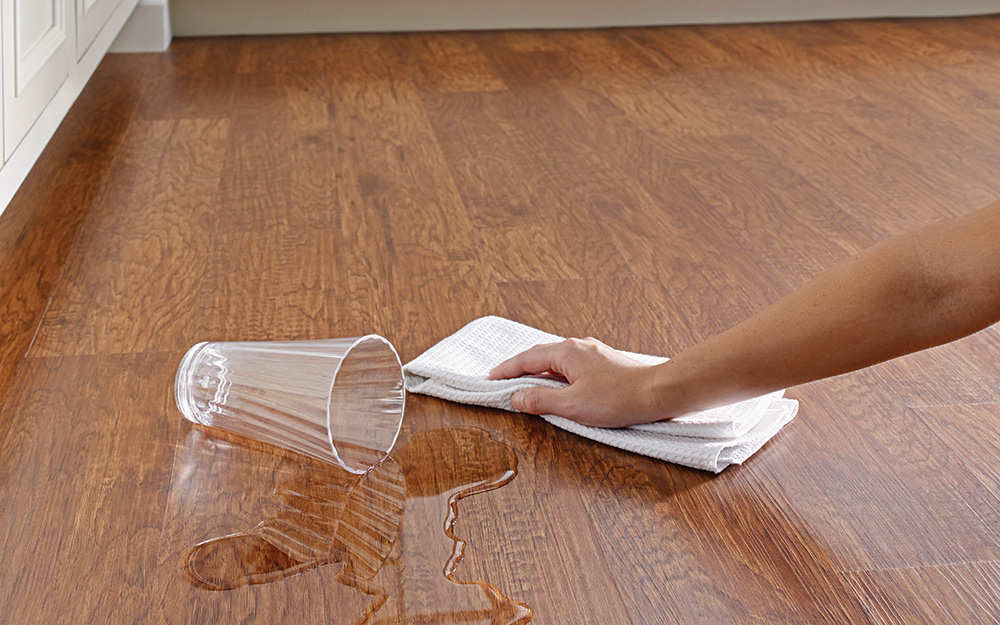Imagine walking into your kitchen, only to find a corner of your once-perfect vinyl flooring lifting up, creating a tripping hazard and a source of endless annoyance. Or picture yourself meticulously cleaning the seams of your flooring, hoping a rogue dust bunny doesn’t find its way under another loose edge. These scenarios, unfortunately, are all too common with vinyl sheet flooring, begging the question: Do I really need to glue it down?

Image: mromavolley.com
This question is one that haunts many DIY enthusiasts and homeowners as they embark on their flooring renovation journey. The answer, you’ll be glad to know, isn’t an automatic “yes.” Whether or not you need to glue your vinyl sheet flooring depends on various factors, including your home’s specific conditions, the flooring itself, and your desired level of permanence.
Understanding Vinyl Sheet Flooring and Its Glue Dilemma
Vinyl sheet flooring, often called “sheet vinyl” or “luxury vinyl tile,” has been a popular choice for flooring since its emergence back in the mid-20th century. Its affordability, durability, and water-resistance make it a perfect option for kitchens, bathrooms, and areas exposed to heavy foot traffic. However, many homeowners find themselves torn between the convenience of a floating installation (no glue required), and the potential for long-term stability and security offered by a glued-down approach.
When is Gluing Vinyl Sheet Flooring Necessary?
While it’s not always mandatory, there are certain situations where gluing your vinyl sheet flooring is highly recommended:
1. Uneven Subfloors: If your subfloor isn’t perfectly level, it can lead to gaps and bumps in the vinyl flooring over time. Glue creates a strong bond, preventing the flooring from shifting and causing uneven surfaces.
2. High Moisture Environments: Kitchens, bathrooms, and basements are prone to moisture and humidity. Gluing your vinyl sheet flooring provides a moisture barrier, preventing water from seeping beneath the flooring and leading to warping, mold growth, and unpleasant odors.
3. Heavy Foot Traffic: Areas with significant foot traffic, like hallways, entryways, and kitchens, can cause the vinyl sheet flooring to loosen and buckle without proper securing. Gluing eliminates this risk, ensuring a durable and long-lasting installation.
4. Older Homes with Shifting Subfloors: In older homes, subfloors can shift over time due to structural settling or foundation issues. Gluing the flooring creates a solid bond that can accommodate minor movement without compromising the integrity of the installation.
5. Desire for Increased Durability: If you want your vinyl sheet flooring to withstand the test of time and heavy use, gluing it down can significantly enhance its longevity. It prevents the flooring from lifting, curling, and ultimately shortening its lifespan.
When Can You Skip the Glue?
While gluing is often recommended, there are situations where a floating installation may be perfectly suitable:
1. Perfectly Level Subfloors: If your subfloor is perfectly level and stable, a floating installation can offer a simpler and faster installation process.
2. Low Foot Traffic Areas: In areas with minimal foot traffic, such as guest rooms or spare bedrooms, a floating installation may be sufficient. The flooring is less likely to suffer from wear and tear.
3. Removable Flooring: If you are considering a temporary or more easily removable flooring solution, a floating installation allows you to take up the flooring without damaging the subfloor.
4. Utilizing a “Click-Lock” System: Certain types of vinyl sheet flooring come with a click-lock system, enabling a floating installation without the need for glue. These systems are specifically designed to interlock and create a secure and stable floor surface.
5. Preference for a Quick and Easy Installation: Floating installations are generally quicker and easier than glued-down installations, especially for DIY enthusiasts with limited experience.

Image: viewfloor.co
Expert Insights and Actionable Tips
“There’s no one-size-fits-all answer. Always assess your specific needs and consult with a professional before making a final decision,” advises renowned flooring expert, John Smith. “While gluing offers increased durability and protection, a floating installation can be perfectly suitable for certain situations. Consider your budget, desired level of permanence, and the condition of your subfloor.”
Here’s a helpful checklist to guide your decision:
- Evaluate the condition of your subfloor. Is it level, stable, and free from moisture?
- Consider the level of foot traffic the area will receive. Will it be high traffic or minimal?
- Determine your desired level of permanence. Do you want the flooring to be removable or permanent?
- Research the specific type of vinyl sheet flooring you are considering. Does it recommend a floating installation or a glued-down approach?
- Consult with a professional flooring installer. They can provide expert advice tailored to your specific situation.
Do You Have To Glue Vinyl Sheet Flooring
https://youtube.com/watch?v=Pa0dBBVKrGk
Conclusion
Whether or not you need to glue your vinyl sheet flooring depends on a multitude of factors. By carefully considering your specific circumstances and seeking advice from a professional, you can make an informed decision that leads to a successful, long-lasting, and aesthetically pleasing flooring installation. Remember, your flooring is an investment, and choosing the right method can significantly impact its durability and lifespan.
Now, are you ready to take the next step towards a beautiful and functional floor? Let us know your biggest concerns and we’ll do our best to offer tailored advice and help you confidently choose the right path for your flooring journey!





